Cuisine: the master’s report
Bruce Anderson
THE NEW ENGLISH KITCHEN by Rose Prince Fourth Estate, £18, pp. 468, ISBN 0007156448 Iam proud of this book, because I have always regarded Rose Prince as my most promising pupil. Over the years, I have taught a lot of girls to cook. By this, I do not mean close supervision at the skillet. As they are born with an innate ability to cook, girls should find it easy to master the basic techniques. But they need to be directed by men who know how to eat (there is an analogy with typing).
The New English Kitchen vindicates my tutelage, for there are signs of mental quickening. This is not just a cookbook, but a work of culinary philosophy. The subtitle is ‘Changing the Way You Shop, Cook and Eat’. Rose Prince stresses the importance of the food chain. The text is spiced with anecdotes about farmers and butchers. If all girls were to study Rose’s homilies, the English table and the English shirt-button would be groaning under the weight of the finest produce.
Our author adores good ingredients. She often writes as if she were up to the elbow in flour, duck fat and blood. In her early chapters, on bread and stock, her prose takes on a shy songbird’s lyricism, as it does when she instructs girls how to extract all the meat from a pig’s head, to make brawn. This book is for the stomach, from the heart.
It passes the basic test which distinguishes a serious cookery book from a massproduction one. Pick it up just after you have had a very good lunch and read a recipe. You will immediately feel hungry. As a cure for any deficiency in appetite, I particularly recommend the pages on braised cockerel with pigs’ trotters.
Rose is writing for the ordinary girl who has to run a kitchen on a limited house keeping allowance. If anything, our author is too aware of the pressure of circumstances on ambitions. This may explain some of the book’s gaps. There is not enough about game. Even if Rose had decided that woodcock and golden plover were esoteric, she ought to have addressed herself to the greatest triumph of English cookery, a jugged hare.
She mentions that her husband Dominic is always on the lookout for road-kills. It would have been useful if she had animadverted on the cooking of hedgehogs. I bet Dominic would never leave them for the crows, and if one has the misfortune to run over Mrs Tiggywinkle, it would be a consolation to be able to scoff her.
There is a more significant omission, the goose. Here, Rose’s excuse was the difficulty in procuring geese. As I have told her, that is feeble. The more our lady cooking writers raise a clamour, or a cackle, the more suppliers will be enticed into the market. Higher goose consumption would mean greater availability of that finest of all kitchen aids, goose fat.
There is another goose product which should also be encouraged, especially in view of the current state of British education. Put geese and comprehensive schools together, and what is the outcome? An endless supply of Sharons and Tracys who might never make hairdressers but who could be trained to funnel corn down a goose’s gullet. That should ensure plenty of foie gras at a reasonable price: some return from the education budget.
In cooking terms, there is an even more basic creature than the goose, and it is surprising that Rose Prince did not theorise more about the pig. She lives in Dorset, not far from Milord Salisbury, who since his withdrawal from the great world of politics has devoted all his energies to pig husbandry, allowing his Emsworth genes free range. Robert Salisbury is now the great chieftain of the porcine race. As a result, Dorset has become the Silicon Valley of pig produce. Cranborne is already turning out bacon of an unrivalled toothsomeness, and has been implored to send boars to reinvigorate the sows of Parma. Those of us who have always considered Parma as girlie-man ham will cheer on the robust infusion of Cranborne loinage. Lord Salisbury himself will not be satisfied until he has created a ham to rival Serrano.
Yet there remain lesser peaks to climb. Cranborne sausages are still somewhat too precious. They have not yet achieved the piggy succulence of the classic English banger. This all tells us just how intellectually challenging the pig is. In her first book, brawn apart, Rose has tended to evade the harder questions posed by cooking pig. That could be her next work: a fitting magnum opus.
But this is a jolly good effort. When next we meet, I shall give her a big kiss. She has produced the ideal birthday present for wives or girlfriends.


























































 Previous page
Previous page